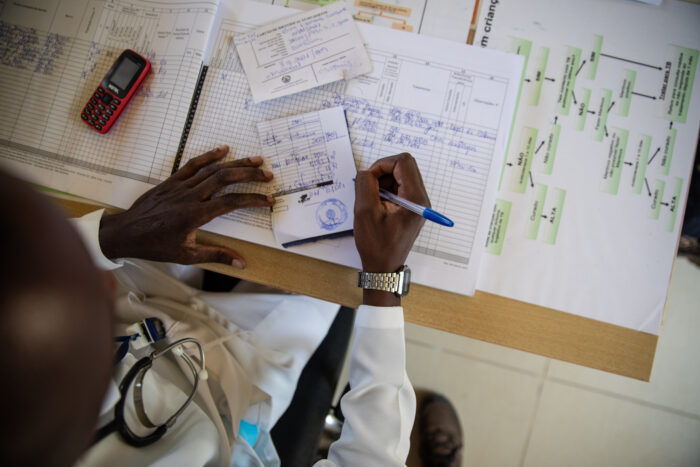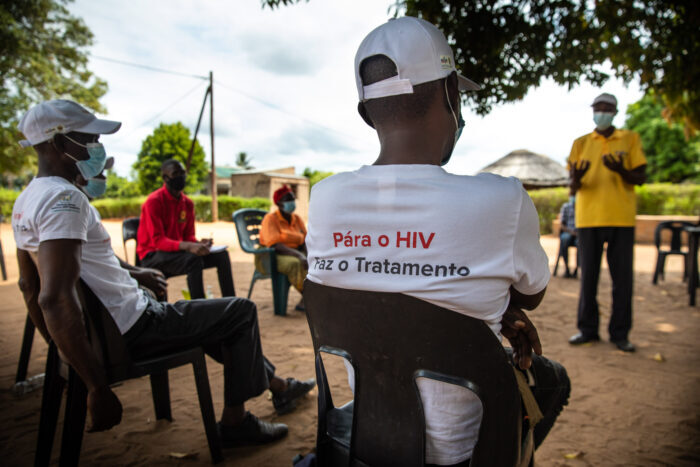Duke Mobegi, associate director of External Technical Assistance at the Elizabeth Glaser Pediatric AIDS Foundation (EGPAF), had spent his afternoon in Zoom calls with the Guinea Ministry of Health. His team had recently worked with Mozambique on increasing the reach and efficacy of differentiated service delivery models for people living with HIV, and were now analyzing the initiative to see how the experience in Mozambique could inform best practices for Guinea as they update their national strategy on HIV self-testing.
“It was great to understand the country’s plans and aspirations towards ending the HIV epidemic, their vast stakeholder support, and innovations to tackle the climate and political challenges faced by the country—as well as better understanding the Guinea population, including language, culture, and access to various media,” says Duke.
Movement towards localization

“There is a great debate in development aid surrounding localization and decolonizing health,” says Duke. “African lobby groups are saying that no [foreign] aid is sustainable, and we want Africans to build our own agenda where we implement our own, homegrown solutions. At the same time, international NGOs [nongovernmental organizations] have been implementing effective solutions for decades—so other areas of the development ecosystem are trying to answer this by saying let’s have the international NGOs pass on all that they’ve learned thus far to local implementing partners who can take the lead in implementing and solving their own challenges.”
And that is exactly what Duke aims to do. Duke became interested in clinical work from a young age and worked in a private hospital for a short time in Kenya before he became interested in influencing health systems through improving programming at national and international levels. He now leads EGPAF’s technical assistance department, which furthers the process of transferring wisdom of EGPAF staff’s extensive experience to local ministries of health and partners for a more sustainable and equitable future.
“Instead of international organizations such as EGPAF simply providing direct services and technical assistance to the ministry, there is now a gradual process of directly funding local implementing partners so there is local ownership and greater long-term sustainability of these interventions.”
“We want to have more self-reliance and ultimately have ministries take over the running of the programs,” says Tsitsi Chatora, the primary technical advisor in the External Technical Assistance department. “Instead of international organizations such as EGPAF simply providing direct services and technical assistance to the ministry, there is now a gradual process of directly funding local implementing partners so there is local ownership and greater long-term sustainability of these interventions.”
In addition to the movement towards self-reliance, progress towards ending the HIV epidemic means the health system needs will change over time. Implementation of major interventions will decrease, and instead the focus will shift towards supporting health systems in maintaining existing high-quality services. “Once we reach epidemic control, [technical assistance] is what will be expected from us,” says Amade Suca, country director for EGPAF Mozambique.
Leveraging African expertise for African solutions
 February 2022, HEALTH CENTER OF MACIA, Locality Macia, District of Xai Xai, Gaza Province, Mozambique.
February 2022, HEALTH CENTER OF MACIA, Locality Macia, District of Xai Xai, Gaza Province, Mozambique.
The vast majority of EGPAF’s work has been implemented by local staff under global funding, so although EGPAF is technically a U.S.-based organization, it is rich with experts across sub-Saharan Africa who have worked across various public health topics for decades. In this sense, EGPAF staff not only have their own personal experience to draw upon, but also the experiences of other African experts who learned through both successes and failures in different regions, community contexts, and types of projects. Duke and Tsitsi tap into this diverse wisdom to see if any of the lessons EGPAF staff have learned can help local partners tackle their own challenges in the form of technical assistance.
“EGPAF has been engaging in technical assistance at various levels for years,” Tsitsi says. “Some of our projects have incorporated this transition of knowledge to local partners, such as Providing Universal Services for HIV/AIDS (PUSH) in Lesotho and Breakthrough in Nigeria. In other cases, we are providing direct technical assistance to ministries of health, local implementing partners, civil society organizations and so forth.”
Supporting Mozambique
 February 2022, BAIRRO 6, Locality Macia, District of Xai Xai, Gaza Province, Mozambique. Community meeting with champion men.
February 2022, BAIRRO 6, Locality Macia, District of Xai Xai, Gaza Province, Mozambique. Community meeting with champion men.
The Mozambique Ministry of Health, through the Global Fund mechanism, engaged EGPAF’s technical assistance team in a tiered request that looks at three key areas: literacy to address socio-economic barriers to equitable access to HIV care and treatment; male engagement in HIV services; and continuous learning to ensure the highest level of care through recurring quality improvement mechanisms.
“In order to strategize with our local Mozambican partners to better engage men, we looked at all of these unique ways EGPAF has provided services targeting men across sub-Saharan Africa, and from there we could take the most effective solutions and work with the Mozambique Ministry of Health to specially design an updated framework for their healthcare system,” Duke says.
As one could imagine, this process takes time, evaluation, and most importantly, strong collaboration with the Ministry of Health, local partners, and EGPAF’s regional and global networks of experts.
“We approach these challenges first by doing a desk review on identifying some of the gaps,” says Duke. “What are they doing currently? What are their strengths? What are their weaknesses? What are some of the opportunities and what are their threats? We then offer recommendations on what they could do to improve their programming. In some instances, we are asked to develop some standard operating procedures on how they implement some of those interventions.”
“I think there is something about being part of the solutions that is so exciting. We want to listen, to bring expertise where it is lacking, collaborating with all these different stakeholders…”
Through the challenges, nuance, and deep collaboration, Duke and Tsitsi have found their calling and EGPAF is lucky they have chosen to apply their skills and leadership to international HIV work.
“I think there is something about being part of the solutions that is so exciting,” Tsitsi says. “We want to listen, to bring expertise where it is lacking, collaborating with all these different stakeholders … it’s quite interesting, and you get to learn from so many different individuals.”
Their peers are aligned with Duke and Tsitsi’s vision for the future. “My perspective is that this is the way to go,” says Amade. “I have been creating an enabling environment for external technical assistance to take place and flourish, and currently we are implementing an external technical assistance project with HIV.”
 |
 |
 |
External Technical Assistance posters created for Mozambique.
A more sustainable future for people living with HIV
Duke and Tsitsi’s goal is clear: to strengthening regional, national, and local capacity to sustain a high-quality, locally owned response to end HIV/AIDS among children, youth, and families. This reflects one of EGPAF’s four strategic goals for 2020-2025, and the External Technical Assistance team, in collaboration with staff across the organization, is essential in pushing this initiative forward. Duke and Tsitsi look forward to supporting many more countries and local implementing partners to design impactful interventions that will ultimately improve people’s health and wellbeing.
“It’s not us addressing that challenge, but instead, how do we support a country to address their own challenge,” Duke says.




